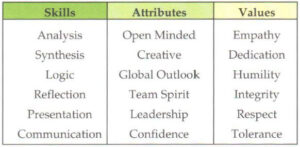

NOTICE:
The AVM Curriculum
Our curriculum is centered around three key themes, which have been chosen as they are of high interest to children and easy to relate to:
- Literacy
- Numeracy
- Science Concepts
Writing
Even toddlers, who can barely hold a crayon or a pencil, are eager to write. We determine children’s emergent writing skills and provide appropriate opportunities to expand them. Children are free to scribble, draw and thus exercise the small muscles of the hand that allow them to make the movements necessary for forming letters and improve hand-and-eye co-ordination.
Reading
Confidence in reading leads to confidence in all walks of life. Our curriculum provides children opportunities to explore books to read, to tell stories, recognise letters and their sounds, play phonic games and sight-read.
Literacy
Literacy includes Listening, Speaking; Reading and Writing, which form the foundation of all learning. If a child is adept in listening, speaking, reading and writing then all other learning becomes easier.
Enquire Now
Listening & Speaking
At AVM children are provided with opportunities to hear new words, use language to communicate ideas / feelings, to ask and answer questions and to tell stories about events that they experience. Our activities encourage children to express themselves, stimulate curiosity and imagination.
Numeracy
It is an important skill that children need for the future in out technological world. AVM helps a child discover Math concepts such as counting, identifying numerals, one-to-one correspondence, matching, sorting by size, shape and colour.
Science Concepts
A young child brings a sense of wonder and curiosity about the world- whether watching snails in an aquarium, blowing bubbles or using a flashlight to make shadows, the child engages in finding out how the world works. At AVM we conduct open-ended activities that involve children who are at various developmental levels. We respond to children’s needs to learn about the world around them and help them attain hands-on experience. We believe in trial and error and welcome errors as valuable information, not as a failure.
Through different facets of the scholastic programmes, a range of skills, attributes and values are built and nurtured in the students, to ensure their holistic development. The following table captures the same:
Every activity both inside and outside the classroom contributes towards the learning process in different, but equally meaningful ways.

